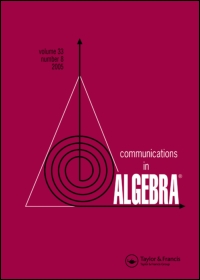 A mathematics journal has withdrawn a paper after discovering that the results were not new.
A mathematics journal has withdrawn a paper after discovering that the results were not new.
The paper, published online in March in Communications in Algebra, explored the properties of group rings, a discipline of algebra. According to editor-in-chief of the journal, Jason Bell, author Francis E. A. Johnson, a professor of mathematics at the University College London, devised a property associated with group rings, and defined it using the term “weakly finite.” But, at the time, Johnson was not aware that other experts had already defined the same property, using the term “stably finite.”
Bell, a professor of mathematics at the University of Waterloo in Ontario, and Lance Small, the journal’s other editor-in-chief, stressed that this issue was “definitely not a matter of plagiarism.” Bell and Small told us in a joint statement that “it was ultimately no one’s fault—it is just one of these things that can happen occasionally in mathematics research.” But given the overlap, the editors thought it best to withdraw the paper, they said:
Johnson’s paper was never published in print and will not appear in print in Communications in Algebra, but it was web-published and a DOI was issued. As a result, a retraction statement was issued, explaining the rationale for this retraction.
Here’s the notice for “On weak finiteness for group rings:”
We, the Editor and Publishers of Communications in Algebra, have removed the following article, originally posted on 8 March 2017: F. E. A. Johnson, “On weak finiteness for group rings,” Communications in Algebra. http://dx.doi.org/10.1080/00927872.2017.1302457. (Received 6 February 2017) We are now cognisant that this paper does not offer new results sufficient to warrant publication. The Accepted Manuscript has been removed from the Latest Articles section of the Journal’s website, and the Editor has rescinded acceptance by the Journal.
According to Bell, Johnson agreed with the recommendation to withdraw the paper.
Johnson confirmed to us that the result of his paper “was already known, albeit with slightly different nomenclature:”
The decision to withdraw (the verb retract is misleading) the paper was taken by me in consultation with the Editor of the journal Communications in Algebra.
Johnson insisted that “The content of the paper is NOT retracted” and “The results of the paper are perfectly valid,” but he “did not wish to be thought to claim credit after the fact.”
Bell and Small, a professor emeritus of mathematics at the University of California, San Diego, provided additional details about what happened:
Professor Johnson … is a topologist and doesn’t typically work on group rings, but he nevertheless made some interesting observations about them and wrote this paper, which he submitted to Communications in Algebra. In the paper he uses the term ‘weakly finite’. The relevant fact is that within the field of group rings the term ‘stably finite’ exists in the literature and was used for the same concept. The results that Professor Johnson proved about weak finiteness had been proved under the guise of stable finiteness in some older papers that Professor Johnson was unaware of this.
The editors explained why the nomenclature issue was not spotted during the journal’s review process:
The anonymous referee is an expert on group rings but was unaware of the connection between stable and weak finiteness.
How did an expert in group rings miss the similarity? According to the editors:
Many sub disciplines within algebra are reasonably broad in terms of scope and …it is probably fair to say that the study of stable finiteness for group rings was a more common endeavor in the `80s than it is today. This is not to say that the study of stable finiteness is not interesting or that no one is currently working on it, but it is inevitable that as fields evolve that some notions will be less familiar in the community than they had been in the past. So it would not be unreasonable for a researcher in group rings today to have only a vague appreciation of stable finiteness and not see the connection with weak finiteness.
Ultimately, Lance Small made the nomenclature connection after reading the web-published paper. Small alerted Bell, who confirmed that the results had already been published using different terminology. Bell then contacted Johnson.
Like Retraction Watch? Consider making a tax-deductible contribution to support our growth. You can also follow us on Twitter, like us on Facebook, add us to your RSS reader, sign up on our homepage for an email every time there’s a new post, or subscribe to our new daily digest. Click here to review our Comments Policy. For a sneak peek at what we’re working on, click here.